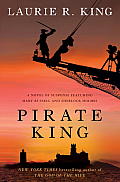 Mary Russell, wife and current (1924) assistant to and chronicler of Sherlock Holmes and his adventures, goes undercover at Fflytte Films at the request of Scotland Yard's Chief Inspector Lestrade. The studio's secretary has gone missing, but more significantly, strange coincidences follow the giant of the British film industry whose reputation has been built based on its realism for example, an increase in drug trafficking after a film about a woman and her drug use. Fflytte's current project, "Pirate King is about a film crew that's making a picture--which is also called Pirate King--about The Pirates of Penzance. The picture's director--the fictional director, not Randolph Fflytte--is dissatisfied with the looks of the men in England, so he takes the production to Lisbon to hire some swarthy types, only to have their boat captured by actual pirates" (39). Russell replaces the missing secretary and joins the cast and crew on a boat destined first for Portugal and then Morocco.
Mary Russell, wife and current (1924) assistant to and chronicler of Sherlock Holmes and his adventures, goes undercover at Fflytte Films at the request of Scotland Yard's Chief Inspector Lestrade. The studio's secretary has gone missing, but more significantly, strange coincidences follow the giant of the British film industry whose reputation has been built based on its realism for example, an increase in drug trafficking after a film about a woman and her drug use. Fflytte's current project, "Pirate King is about a film crew that's making a picture--which is also called Pirate King--about The Pirates of Penzance. The picture's director--the fictional director, not Randolph Fflytte--is dissatisfied with the looks of the men in England, so he takes the production to Lisbon to hire some swarthy types, only to have their boat captured by actual pirates" (39). Russell replaces the missing secretary and joins the cast and crew on a boat destined first for Portugal and then Morocco.
Published in September 2011 The Pirate King is the 11th installment in Laurie R. King's Mary Russell and Sherlock Holmes mystery series. I requested a review copy of the novel, despite not having read any of the other books in the series, since I was in the mood for a dose of Sherlock Holmes. I'm pretty open-minded when it comes to adaptations, sequels of classics written by contemporary writers, et cetera, and I was intrigued with the idea of Holmes having taken a wife.
Now, I'll admit right now that I didn't finish the book, which is not to say that I didn't give it the old college try. I read 100+ pages before I threw in the towel. Why didn't I finish it? The plot was overcomplicated--even the "author" Mary Russell says in her author's note, "I fear that the credulity of many readers will be stretched to the breaking by the case's intricate, and shall we say, colourful complexity of events" (10)--and the mystery wasn't compelling to me.
Mary Russell, who seems to have taken over for Dr. Watson, is the sole investigator (through chapter 15 at least). Holmes appears only at the very beginning of The Pirate King when he convinces her to go along with Lestrade's plan and as an addressee for Russell's correspondence from the field. This would likely not be a problem for series fans, but it was a source of great disappointment for me. While the film-within-a-film bit was complicated enough especially considering the studio's strict adherence to realism and insistence on not making changes to the film's script, King adds in an abundance of secondary characters a number of whom are excessively complicated themselves (case in point: the Portuguese translator with multiple personalities born out of intellectual need). Where I stopped reading more than a third of the way through, the story was still so bogged down in set-up that I'd nearly forgotten that Russell was supposed to be getting to the bottom of some sort of mystery.
I assume that fans of Mary Russell and this series will enjoy The Pirate King. I'd caution others not to use The Pirate King as an introduction to the series, but to start at the beginning with The Beekeeper's Apprentice.
disclosure: I received a review copy of The Pirate King from Random House via NetGalley.

No comments:
Post a Comment